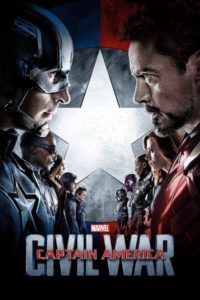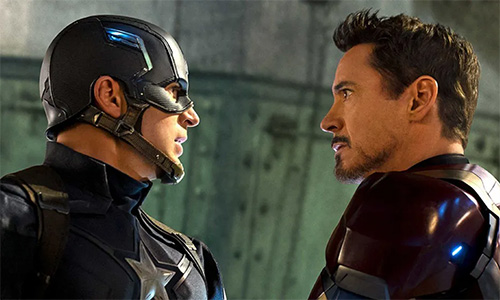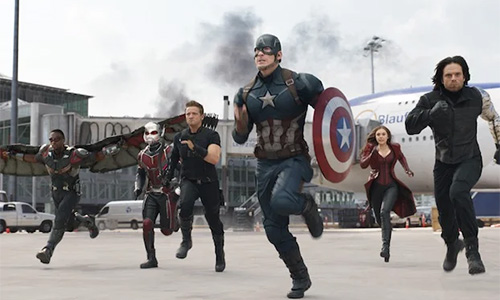 Captain America: Civil War is perhaps the greatest superhero movie that Christopher Nolan has not directed. My two favorite superhero movies (The Dark Knight and The Dark Knight Rises) belong to him. As of this post, my third favorite is a toss-up between Batman Begins, Iron Man, and Captain America: Civil War. Others (such as The Amazing Spider-Man, Iron Man 2, Captain America: The Winter Soldier, etc.) are up there, but there is clearly a distinction between the top 3 or 4 and all of the others. I hope superhero movies continue to improve, but unfortunately, we get 3 to 4 bad ones for every good one. So when we get a film like Captain America: Civil War, it’s important to take pause, see it, praise it, and encourage more movies like it because we know that poor movies will continue to be made because all of them seem to gross over $100 million easily. And the reason they do is our fault. We continue to see these terrible movies. But that is a different story for a different day.
Captain America: Civil War is perhaps the greatest superhero movie that Christopher Nolan has not directed. My two favorite superhero movies (The Dark Knight and The Dark Knight Rises) belong to him. As of this post, my third favorite is a toss-up between Batman Begins, Iron Man, and Captain America: Civil War. Others (such as The Amazing Spider-Man, Iron Man 2, Captain America: The Winter Soldier, etc.) are up there, but there is clearly a distinction between the top 3 or 4 and all of the others. I hope superhero movies continue to improve, but unfortunately, we get 3 to 4 bad ones for every good one. So when we get a film like Captain America: Civil War, it’s important to take pause, see it, praise it, and encourage more movies like it because we know that poor movies will continue to be made because all of them seem to gross over $100 million easily. And the reason they do is our fault. We continue to see these terrible movies. But that is a different story for a different day.
Not everything Marvel does is a hit. Not all of the movies involving members of The Cast are enjoyable experiences. I’ve hated Thor and Thor: The Dark World. And while The Avengers was entertaining, I was uninterested and turned it off when watching The Avengers: Age of Ultron. I may give it another chance, but I don’t know. I’m not the biggest fan of the witty banter during fight scenes. I know that is one of the characteristics that separates Marvel from DC Comics, but it gets old quickly. And that was the first 30 minutes of The Avengers: Age of Ultron. When I wanted a story and a little drama, I got an action-comedy routine between Captain America, The Hulk, Thor, Iron Man, Black Widow, and Hawkeye. I just wasn’t interested in this type of movie.
I realize there is a sequence for watching these Avengers movies, and when you miss one, you may miss a lot. But some of these lesser movies were truly abysmal. Before I get into my review of Captain America: Civil War, one of the best things it had going for it was that there was no Thor or Hulk in it. I’m still waiting for a good movie featuring either character. Unfortunately, by not seeing The Avengers: Age of Ultron, I missed the introduction of Wanda Maximoff/Scarlet Witch (Elizabeth Olsen – Godzilla, Oldboy) and Jarvis/Vision (Paul Bettany – Master and Commander: The Far Side of the World, A Beautiful Mind). And because these Avengers movies are all intertwined, I had to pick up the pieces about these two characters on my own. It wasn’t the end of the world, but I could see future Avenger movies becoming more frustrating with each prior film missed.
Brother directors Anthony and Joe Russo (Captain America: The Winter Soldier, You, Me, and Dupree) seem to co-direct all of their movies. And it seems to work for them. They’ve been chosen to direct the third installment of The Avengers movie (2019’s Avengers: Infinity War, Part II). With this movie, the duo had the cast of casts and probably the best script to work with. It was different than all of the other movies involving The Avengers. You’ve got The Avengers, at first arguing and then going after each other physically. And it was completely believable. It wasn’t just some lousy movie with a big battle that the Russos knew they could get away with and still make much money from. The brothers also got to work with Spider-Man (Tom Holland – The Impossible). I’ll discuss incorporating Spider-Man and Ant-Man (Paul Rudd – This Is 40, Ant-Man) later in this review. I’ll preview by saying I understood a couple of reasons why they were incorporated, but, at the same time, I questioned their importance and their positive impact on this film.

As mentioned, this is as believable a superhero premise as there is. The setting is Nigeria, and Brock Rumlow (Frank Grillo – End of Watch, The Grey) tries to smuggle a bioweapon from the Center for Infection Diseases. After Steve Rogers/Captain America (Chris Evans – Captain America: The Winter Soldier, Snowpiercer) corners him and demands which buyer it is, Rumlow says it is Bucky Barnes/The Winter Soldier (Sebastian Stan – The Martian, Black Swan). This has Rogers in disbelief, but before he can ask any more questions, Brock blows himself up with the bomb. The Scarlet Witch instinctively contains the burst and does save a bunch of people, but in the process, it sends the bomb into a nearby building and kills a handful of relief aid workers.
Ironically, this raises a similar question in Batman v Superman: Dawn of Justice. That question is, how does society hold these superheroes accountable for their actions? Just like Batman and Superman, characters like Iron Man, Captain America, and The Scarlet Witch do more good than harm, but what can’t be ignored is the innocent lives that get lost along the way with seemingly no repercussions. Unfortunately, the national governments and the United Nations want The Avengers (basically private military contractors) to defer to them. US Secretary of State Thaddeus Ross (William Hurt – A History of Violence, Kiss of the Spider Woman) refers to The Avengers as dangerous heroes who ignore sovereign borders and seem unconcerned by damage caused.
Some refer to the group as vigilantes. Essentially, the US Government wants to assume control of The Avengers. And this is where the division occurs. Some agree that The Avengers should have government control over them just like they do other government assets. Some of The Avengers even confess that they act out of impulse or compulsion and then find ways to justify it afterward. Like all of us, their past struggles influence their actions in their current life. Without some regulation and strict accountability for their actions, what makes The Avengers different from civilians who cause injury or harm to others? Chief among those supporting regulation is Tony Stark/Iron Man (The Judge, Iron Man), who knows that he’s had far too much independence and too much control and that his actions have often been obscured by past trials and tribulations in his personal life. The most notable opposer of this new regulation is Rogers, who believes in what The Avengers do. Part of what makes them such a cohesive, efficient, and effective unit is their ability to make decisions independently and on the fly without the government’s red tape.

Herein lies the chief storyline. There are many others, but ultimately, the story revolves around this chief concern. The Avengers’ decision on this issue will forever change how they operate. Because they cannot agree, we have a civil war between the groups. Seeing the human side of so many different superheroes in such a short period is riveting. We learn what drives them. We learn what haunts them. We know what they believe in. So, while there are many subplots and plenty of action, the internal strife separates this movie from so many others. Siding with Iron Man are his forever loyal comrade Lieutenant James Rhodes/War Machine (Don Cheadle – Hotel Rwanda, television’s House of Lies), The Black Widow (Scarlett Johansson – Lost in Translation, Don Jon), Vision, and T’Challa/Black Panther (Chadwick Boseman – 42, Draft Day) who decides to join forces against what he believes are the rogue superheroes after his father is killed in Vienna during a meeting where regulations concerning The Avengers (called The Sokovia Accords) were set to be discussed. Those who do not support regulation are on the other side of the line.
The leader of this group is Rogers. With him are The Winter Soldier, Sam Wilson/Falcon (Aaron Mackie – The Hurt Locker, Man on a Ledge), Wanda Maximoff/Scarlet Witch, and Hawkeye (Jeremy Renner – The Hurt Locker, The Town). And because they can, the Russos also introduce Spider-Man into the film (Holland’s Spider-Man has his own origin story coming in 2017). And to balance out Spider-Man’s introduction, Ant-Man is also called back into battle. Spider-Man and Ant-Man certainly were unnecessary for this film to work, and, at times, I wish they weren’t brought back. They added a specific comic element that just wasn’t needed. You already had enough going on. But, again, I understand why the Russos had them in the film for many different reasons.
Captain America: Civil War is one of the best superhero movies ever. It isn’t as dark as Christopher Nolan’s Batman franchise, but it is still good. As with all Marvel movies, it is certainly lighter in tone when compared to the DC Comics movies, and some of the inside jokings that occur during the battle scenes are a little ridiculous. But this one is deeper and takes itself far more seriously compared to many other Avengers movies. The battle scenes are fantastic. They are not overblown, too loud, or too long. And they have a purpose. Sure, it is over the top to believe that these unbelievably fast and strong forces are striking each other, and nobody really gets hurt, but that is the fun, too. Like with almost all superhero movies (Nolan’s Batman movies might be the exception), you must suspend your beliefs when walking into the theater. But if you can, you have set yourself in for an enthralling ride.
This movie is not to be missed, especially on the big screen.
Plot 10/10
Character Development 10/10
Character Chemistry 9/10
Acting 8/10
Screenplay 10/10
Directing 10/10
Cinematography 10/10
Sound 10/10
Hook and Reel 10/10
Universal Relevance 9/10
96%
A
Movies You Might Like If You Liked This Movie
- Captain America: The First Avenger
- Avengers: Endgame
- Black Panther: Wakanda Forever
- Iron Man
- G.I. Joe: The Rise of Cobra